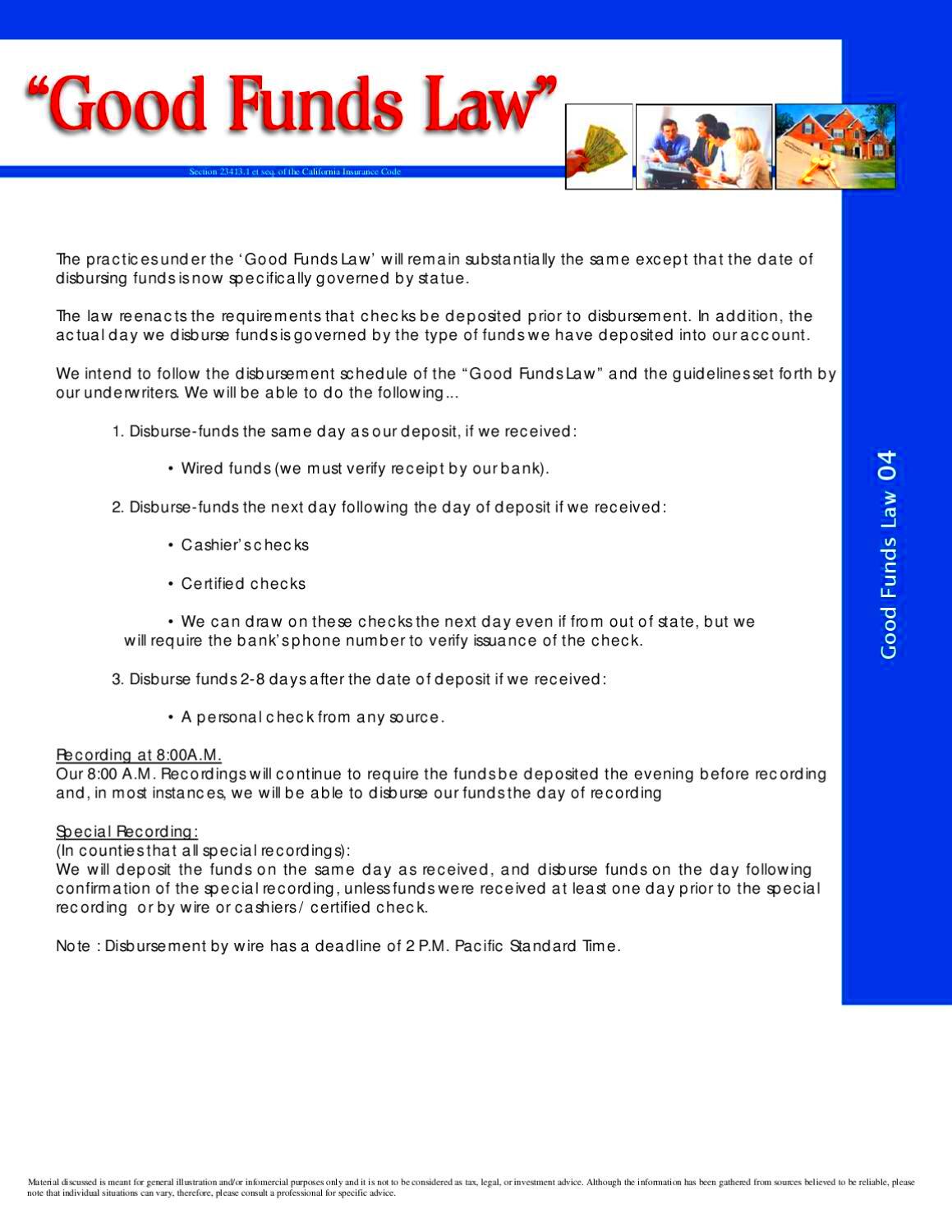An Overview of Good Funds Law
Good Funds Law is one of the most significant laws concerning real estate transactions. The main objective of this legislation is to protect everyone concerned, a situation where money is both legitimate and available when required. The law’s intent is to minimize risks attached to financial transactions mainly in relation with properties while fighting against deception. When funds are verified and cleared prior to closing, an environment favorable for buyers, sellers as well as lenders is generated by this legislation.
Key Principles of Good Funds Law

In order to guarantee the genuineness of financial dealings, there are a few fundamental notions that Good Funds Law is based on:
- Verification of Funds: All funds must be verified as legitimate and cleared before they can be used in a transaction.
- Transparency: Parties involved in the transaction must have clear information regarding the source and availability of funds.
- Timeliness: Funds must be made available in a timely manner to avoid delays in closing the transaction.
- Protection Against Fraud: The law aims to prevent fraudulent activities by ensuring that only legitimate funds are used.
For those working in real estate, a comprehension of these principles is crucial as they form the basis for safe dealings.
Impact of Good Funds Law on Real Estate Transactions

The implementation of the Good Funds Law has had a substantial influence on real estate transactions in several ways:
- Increased Security: By verifying funds before closing, the law helps protect against fraud, providing peace of mind to buyers and sellers.
- Streamlined Processes: With clear guidelines on the handling of funds, transactions can proceed more smoothly, reducing the chances of last-minute complications.
- Enhanced Trust: The requirement for verified funds fosters a culture of trust between parties, encouraging more straightforward negotiations and transactions.
- Greater Accountability: Everyone involved in the transaction is held accountable for ensuring that funds are legitimate and available, leading to a more responsible approach to real estate dealings.
From the perspective of all participants in these transactions, this law has improved both safety and efficiency in real estate transactions.
Legal Obligations Under Good Funds Law
The Good Funds Law sets forth certain legal responsibilities which must be complied with by all individuals involved in real estate deals. These duties are key for the safe and seamless conduct of such exchanges. Knowledge of these requirements will assist purchasers, vendors and players in the field of real estate to maneuver through different intricacies surrounding the legislation.
The key legal duties that crop up as a result of the Good Funds Law are as follows:
- Verification of Funds: Before closing, all parties must verify that the funds are legitimate and cleared. This often involves providing proof of funds, such as bank statements or cashier’s checks.
- Timely Submission: Parties must submit verified funds in a timely manner to avoid delays in the closing process. Each state may have different timelines for when funds need to be presented.
- Disclosure Requirements: All parties are required to disclose the source of funds, ensuring transparency and trust in the transaction.
- Compliance with State Regulations: Different states have varying laws regarding Good Funds, so it’s essential to be aware of local regulations that might apply.
If you don’t follow through on these commitments there may be severe ramifications like transaction holdups, lawsuits or even monetary sanctions. For this reason it is important that one understands and adheres to these legal stipulations so as to have a successful real estate transaction.
Exceptions to Good Funds Law Requirements
If you are a buyer or seller, then it is of great essence to understand the exceptions to the law governing good funds because they are helpful.
Here are several frequent exceptions to the requisites of Good Funds Law:
- Certain Government Transactions: Some government-backed transactions may have different fund verification processes or exemptions.
- Pre-Approved Financing: Transactions involving pre-approved financing or lines of credit might not require the same level of fund verification as typical transactions.
- Cash Transactions: In some jurisdictions, cash transactions may be exempt from certain Good Funds Law requirements, although this can vary widely by location.
- Trust Accounts: Funds held in trust accounts managed by licensed professionals may have different verification rules under Good Funds Law.
Consulting a lawyer is of utmost importance in order to understand all the details surrounding these exceptions because they vary considerably depending on the jurisdiction and the kind of transaction.
Challenges in Implementing Good Funds Law
Yet there are several complications in enforcing its regulations, despite the crucial role that Good Funds Law plays. Therefore, real estate agents and clients should keep pace with these intricacies in order to facilitate smooth dealings in the sector.
Here are a few ordinary issues met when putting into practice the Good Funds Law:
- Lack of Understanding: Many parties involved in real estate transactions may not fully understand the law, leading to mistakes and delays. Education and training are essential.
- Variability Across States: Good Funds Law can vary significantly from state to state, making it challenging for those involved in transactions across different jurisdictions.
- Delays in Fund Verification: The process of verifying funds can sometimes lead to delays, especially if documentation is incomplete or not provided in a timely manner.
- Resistance to Change: Some real estate professionals may be resistant to adopting new procedures associated with Good Funds Law, which can hinder its effective implementation.
Frequently, it is necessary to involve continuous education, transparent conversation and abiding by rules so that each person can enjoy the safeguarding aspect of Good Funds Law when dealing with these difficulties.
When facing these difficulties, continued education, unrestricted discussions and conformity with laws are increasingly necessitated so that everyone can gain the protection accorded by the Good Funds Act.
Future of Good Funds Law
As far as the real estate sector is concerned, compliance with Good Funds Legislation remains a critical area of concern. There is a high chance that this particular law will become more important as property transactions become more digitalized while people start to realize its connection to frauds. Advances in technologies also imply that revisions and changes in the law will have to be made regularly so that they keep up with what is happening today.
There are certain trends that may influence the future of Good Funds Law:
- Integration of Technology: The use of blockchain and other secure technologies can streamline the verification process, making it easier to confirm the legitimacy of funds.
- Standardization Across States: There may be movements toward more standardized regulations across different states, helping to reduce confusion and ensure smoother transactions.
- Increased Regulation: As real estate transactions grow more complex, we might see heightened regulatory measures aimed at further protecting consumers and preventing fraud.
- Education and Training: There will likely be a greater emphasis on training for real estate professionals to ensure everyone understands the implications of Good Funds Law.
When everything is said and done here, it is important that all parties involved in the real estate market remain updated and flexible as these patterns develop. A preemptive action may help safeguard transactions by encouraging compliance and creating a less risky setting.
FAQs About Good Funds Law
It is common to have many questions regarding the Good Funds Law. To help with this, we’ve put together some of the frequently asked questions about its implications:
- What is Good Funds Law? Good Funds Law requires that all funds involved in a real estate transaction be verified as legitimate and cleared before closing.
- Who is affected by Good Funds Law? Buyers, sellers, real estate agents, and lenders are all impacted by Good Funds Law.
- What happens if I don’t comply with Good Funds Law? Non-compliance can lead to delays in closing, potential legal issues, and financial penalties.
- Are there exceptions to Good Funds Law? Yes, certain transactions, such as government-backed deals, may have specific exemptions.
- How can I ensure compliance with Good Funds Law? Consulting with a knowledgeable real estate attorney or professional can help ensure that all legal obligations are met.
If you’re just getting started with Good Funds Law, then these FAQs may be of help as they address typical issues people often have and which might require finding answers.
Conclusion on Good Funds Law
The Vital Role Good Funds Law Play to Ensure Integrity and Security in Real Estate Transactions. The Act protects against frauds and misunderstandings by ensuring that money is legitimate and verified. There are obstacles when enforcing this law, but its benefits surpass those limitations.
The Good Funds Law will remain adaptable at the level of its laws so that it can be in tandem with the changing dynamics of the markets and also in step with new developments in technology. In this respect, real estate stakeholders such as buyers, sellers or professionals need to be constantly updated about these legal requirements and comply with them as well. In an era where trust and security count most highly, Good Funds Law plays a critical role in making sure that there is dependability within the real estate industry.
